Top Strategies for Effective Laboratory Operations Management
Laboratory operations are critical for achieving reliable scientific results. Recent innovations in technology and processes are transforming laboratory operations, enhancing efficiency and supporting scientific breakthroughs.
This article covers practical strategies for optimizing workflows, standardizing procedures, and effective resource management in labs.
Key Takeaways
-
Effective laboratory operations management requires defining processes, establishing SOPs, and optimizing workflows to enhance efficiency and ensure reliable scientific results.
-
Strategic budgeting and resource allocation are essential for maintaining operational continuity and enhancing overall laboratory performance through efficient financial management.
-
Maintaining safety and compliance is a top priority in laboratory operations. Implementing rigorous quality control measures and continuous personnel training fosters a culture of safety and excellence, ensuring accurate results and high standards.
Defining Laboratory Operations
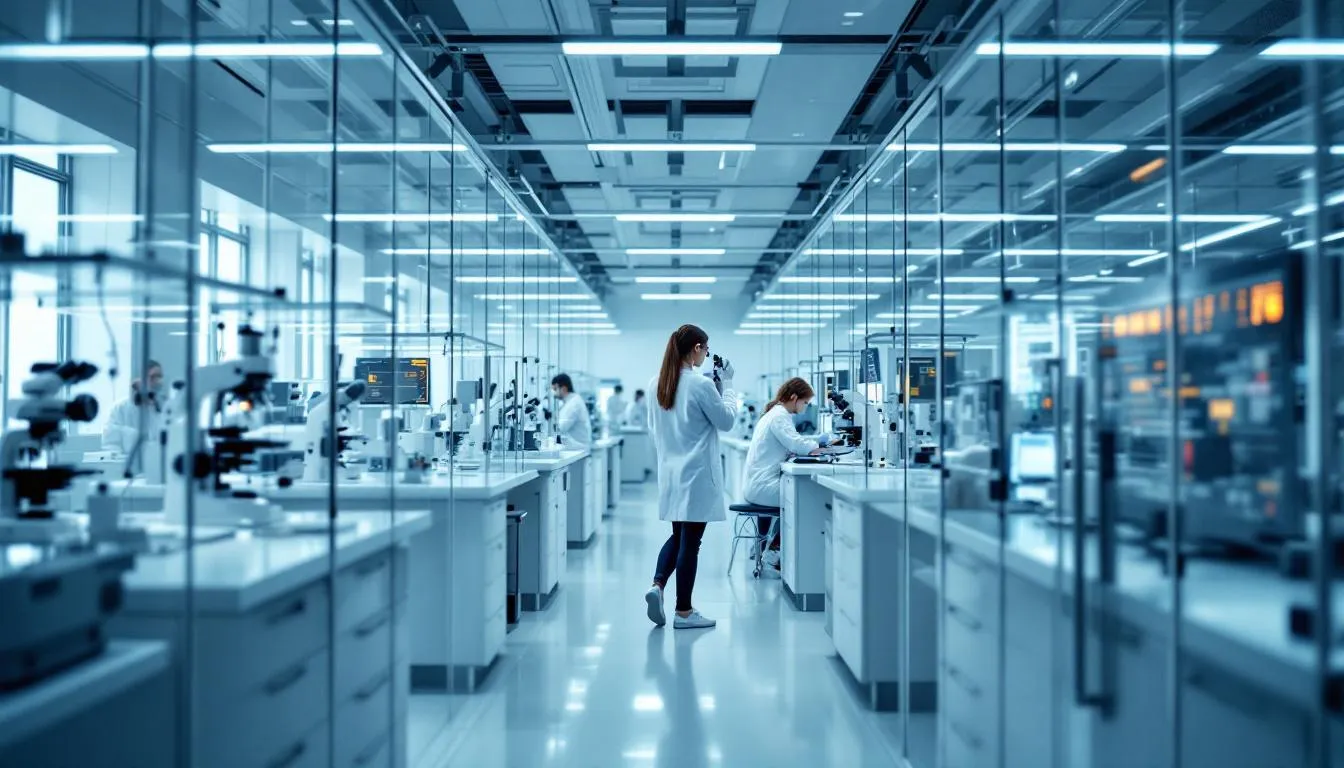
Laboratory operations involve employing chemical, physical, or biological methods for conducting research or tests. These operations are fundamental to supporting a wide range of sciences, including biomedical sciences, and play a key role in advancing research and development across multiple scientific disciplines. At the core of laboratory management operations management is defining processes and workflows that ensure adherence to standards. This meticulous approach is crucial for maintaining the integrity and reliability of scientific results. Effective laboratory operations management ensures that every step, from sample collection to data analysis, is executed with precision.
In a dynamic laboratory setting, research and development can significantly impact laboratory operations by altering Standard Operating Procedures (SOPs) and operational flows. The ability to adapt and refine these processes is essential for maintaining operational efficiency and staying at the forefront of scientific innovation. Effective data management plays a pivotal role in this context, ensuring accurate and reliable data collection that enhances research productivity and facilitates the discovery of meaningful insights.
Standardizing laboratory processes offers numerous benefits, including improved quality at peak operations. Identifying potential bottlenecks and delays allows laboratories to implement strategies that optimize workflows and enhance overall operational performance. This holistic approach to laboratory operations management sets the foundation for excellence in scientific research and development.
Establishing Standard Operating Procedures (SOPs)
Establishing Standard Operating Procedures (SOPs) is a cornerstone of laboratory operations management. SOPs help ensure that laboratory processes are carried out consistently and accurately by all personnel, which is essential for maintaining operational efficiency and meeting regulatory standards. These procedures provide a clear framework for conducting experiments, handling samples, and maintaining equipment, thereby reducing variability and enhancing the reliability of results. Additionally, process definition and design involve lab SOPs adhering to international or national standards, ensuring global compliance and operational excellence.
Implementing SOPs also facilitates training programs for laboratory staff, ensuring that everyone is well-versed in the required procedures and practices. This not only improves operational efficiency but also supports continuous improvement by allowing for regular updates and refinements to the procedures based on new insights and technological advancements.
Workflow Optimization
Workflow optimization is a critical aspect of laboratory operations management. Improving workflows can lead to better efficiency and increased productivity across operations. Analyzing and refining lab workflows streamlines processes, reduces time-consuming tasks, and enhances overall efficiency. This involves identifying and addressing potential bottlenecks and delays that may hinder smooth operations.
Effective workflow optimization requires team collaboration and a comprehensive understanding of the various processes involved in laboratory operations. Fostering a collaborative environment and leveraging training programs ensures that all team members are aligned with optimized workflows, enhancing operational efficiency and achieving top-quality results.
Setting Up a Laboratory
Setting up a laboratory requires careful planning and attention to detail to create an environment that supports efficient laboratory operations management and successful scientific research. A thoughtfully designed laboratory setting is crucial for fostering innovation, ensuring safety, and enabling researchers to achieve reliable results. By establishing a well-organized and functional laboratory, research teams can maximize productivity and maintain high standards in all aspects of laboratory operations.
Planning and Design Considerations
Effective laboratory management begins with a strategic approach to planning and design. It is essential to consider the specific type of scientific research to be conducted, the necessary lab equipment, and the number of personnel who will use the space. The laboratory layout should prioritize safety and operational efficiency, providing ample room for equipment, storage, and smooth workflow. Incorporating flexible workspaces allows the lab to adapt to evolving research needs and technological advancements.
Implementing standard operating procedures (SOPs) from the outset is vital for maintaining consistency in equipment calibration, data management, and inventory control. These procedures help safeguard data integrity and streamline laboratory processes, ensuring that all activities—from sample handling to data analysis—are performed accurately and efficiently. By focusing on these foundational elements, laboratory management can create an environment where researchers have the resources and support needed to excel.
Essential Infrastructure and Equipment
A successful laboratory relies on robust infrastructure and essential lab equipment tailored to its research focus. Key instruments may include microscopes, spectrophotometers, and advanced mass spectrometry systems, all of which are critical for precise data collection and analysis. Equally important are data management systems that facilitate the secure storage, retrieval, and analysis of research data, supporting both compliance and scientific discovery.
To maintain operational efficiency, laboratories must also invest in reliable supplies of consumables, such as chemicals and reagents, and implement systems for tracking samples and managing inventory. Embracing continuous improvement and innovation—such as adopting automation-friendly technologies and upgrading equipment—can streamline lab workflows, enhance accuracy, and minimize errors. By prioritizing the integration of cutting-edge technology and best practices, laboratories can ensure they remain at the forefront of scientific research and operational excellence.
Budgeting and Resource Allocation
Effective budgeting and resource allocation are critical components of laboratory operations management. A well-structured budgeting plan allows laboratories to cover various expenses, including inventory, staff fees, and payments, ensuring smooth processes and operational continuity. Careful planning and resource allocation maximize efficiency and accuracy, ultimately enhancing overall performance.
Implementing new approaches and technology in budgeting can significantly enhance operational efficiency and improve performance. Strong financial management principles enable labs to make informed decisions about resource allocation, ensuring that funds are used effectively to support critical operations and projects.
This strategic approach to budgeting and resource allocation is essential for maintaining a high level of operational efficiency in laboratory settings.
Financial Planning
A well-structured budgeting plan minimizes waste and boosts productivity by preventing overspending. Detailed financial planning helps laboratories allocate funds efficiently by comparing costs against benefits, ensuring that resources are used effectively to support critical operations and projects. This approach not only enhances laboratory performance but also ensures that financial resources are managed prudently.
Implementing preventive maintenance can significantly lower the costs associated with equipment repairs and replacements, further contributing to financial efficiency. Incorporating preventive maintenance into the budgeting plan reduces unexpected expenses and extends the lifespan of equipment, ultimately saving costs and improving overall operational efficiency.
Resource Management
Strategic resource management plays a critical role in laboratory operations management. Efficient allocation of resources ensures that staff, equipment, and materials are utilized effectively to meet high demands and maintain optimal operations. By implementing effective resource management strategies, laboratories can handle increased workloads and achieve better operational efficiency.
Efficient sample tracking systems can significantly reduce the time taken to process samples, further enhancing operational efficiency. By ensuring that resources are allocated and managed effectively, laboratories can improve productivity, reduce turnaround times, and maintain a high level of operational performance.
Equipment Calibration and Maintenance
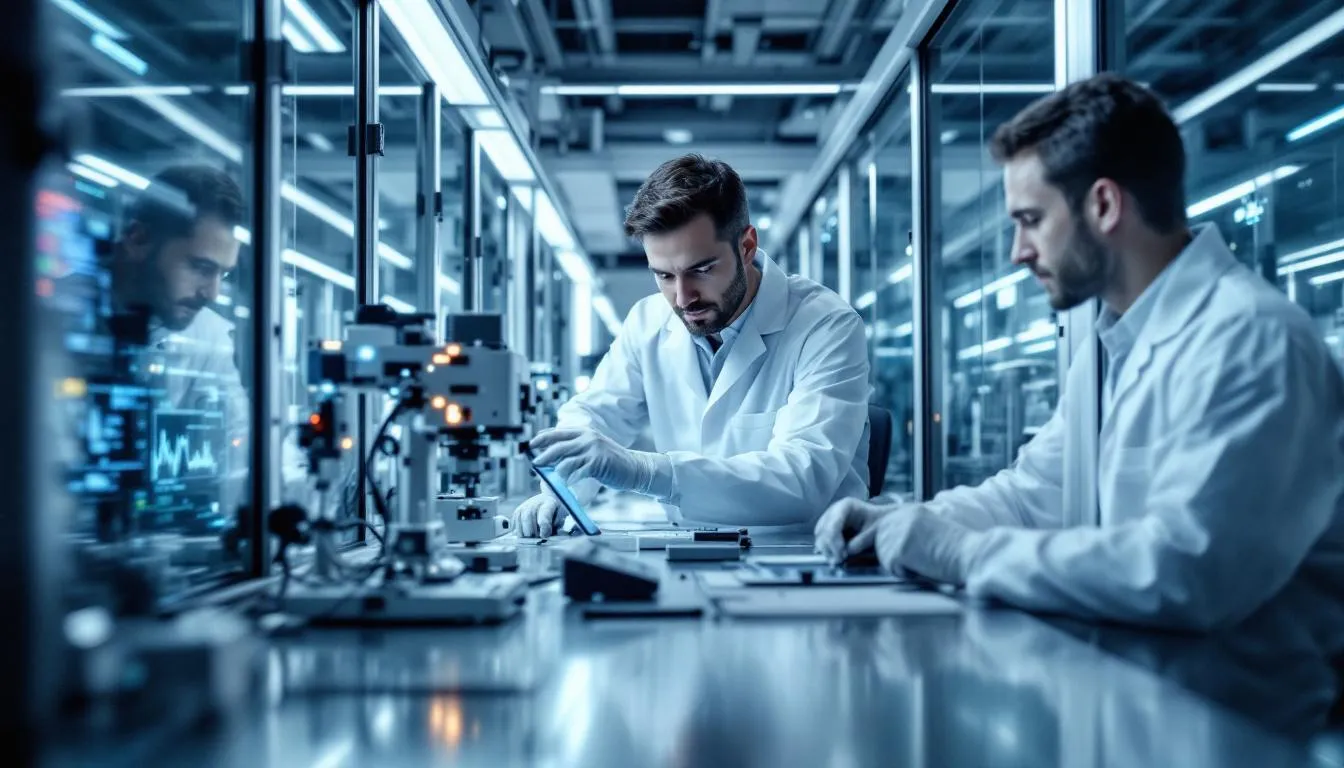
Regular maintenance and calibration of laboratory equipment are fundamental to ensuring reliable and reproducible results. Frequent calibration is crucial for maintaining accuracy and efficiency in laboratory operations, as it ensures that instruments provide consistent and reliable measurements.
By prioritizing equipment calibration and maintenance, laboratories can enhance the quality of their operations and ensure accurate results.
Calibration Protocols
Establishing clear calibration protocols is vital for ensuring that laboratory instruments deliver consistent and reliable measurements. Calibration should be performed using standardized references to ensure the accuracy of laboratory measurements, with the frequency of calibration determined by factors such as equipment type and usage frequency.
Calibration processes should be documented and may involve either in-house staff or external service providers. Maintaining detailed records of calibration procedures ensures analytical accuracy and prevents the use of faulty reagents, ultimately enhancing the reliability of results.
Preventive Maintenance
Preventive maintenance includes regular inspections and servicing, which help extend the life of lab equipment and ensure safety. Implementing preventive maintenance practices identifies potential issues before they lead to equipment breakdowns, enhancing operational reliability and reducing the risk of inaccuracies in research results.
Regular inspections and servicing are essential components of preventive maintenance, as they help maintain the accuracy and longevity of laboratory instruments. By prioritizing preventive maintenance, laboratories can ensure continuous improvement in their operations and achieve high-quality results consistently.
Sample Management
Efficient sample management is crucial in laboratory operations as it prevents errors and ensures data integrity. Effective sample lifecycle management involves proper handling, data collection and management, and robust tracking mechanisms, facilitating smooth and streamlined operations in the lab.
Efficient sample management practices maintain the integrity of samples throughout the laboratory process, ensuring accurate and reliable results. This comprehensive approach to sample management is essential for achieving high-quality outcomes in scientific research and testing.
Accessioning and Tracking
Barcodes and digital systems are effective methods for tracking samples in laboratory operations, enhancing accuracy and efficiency. The implementation of Laboratory Information Management Systems (LIMS) supports real-time tracking of samples, improving accuracy in laboratory data management. Additionally, tracking samples and managing lab inventory with digital tools improves efficiency, ensuring that resources are utilized effectively and operations run smoothly.
A well-organized and streamlined sample lifecycle through standardized processes ensures that samples are not damaged or misplaced, reducing turnaround time in laboratory operations. Following strict protocols for sample handling, including proper labeling and transportation, minimizes pre-analytical errors and maintains data integrity.
Storage Solutions
Utilizing trusted suppliers for lab storage solutions is critical, as their product quality can significantly impact safety and compliance with standard regulations. Proper sample storage at cryogenic temperatures is essential for securing biological specimens and genomic materials over long periods, ensuring their integrity for future analysis.
Automation-friendly cryotubes enhance scalability and compatibility with various barcoding technologies for sample identification, improving workflow and sample management efficiency. Using appropriate sealing methods for sample storage plates maintains sample integrity and ensures accurate results.
Quality Control and Assurance
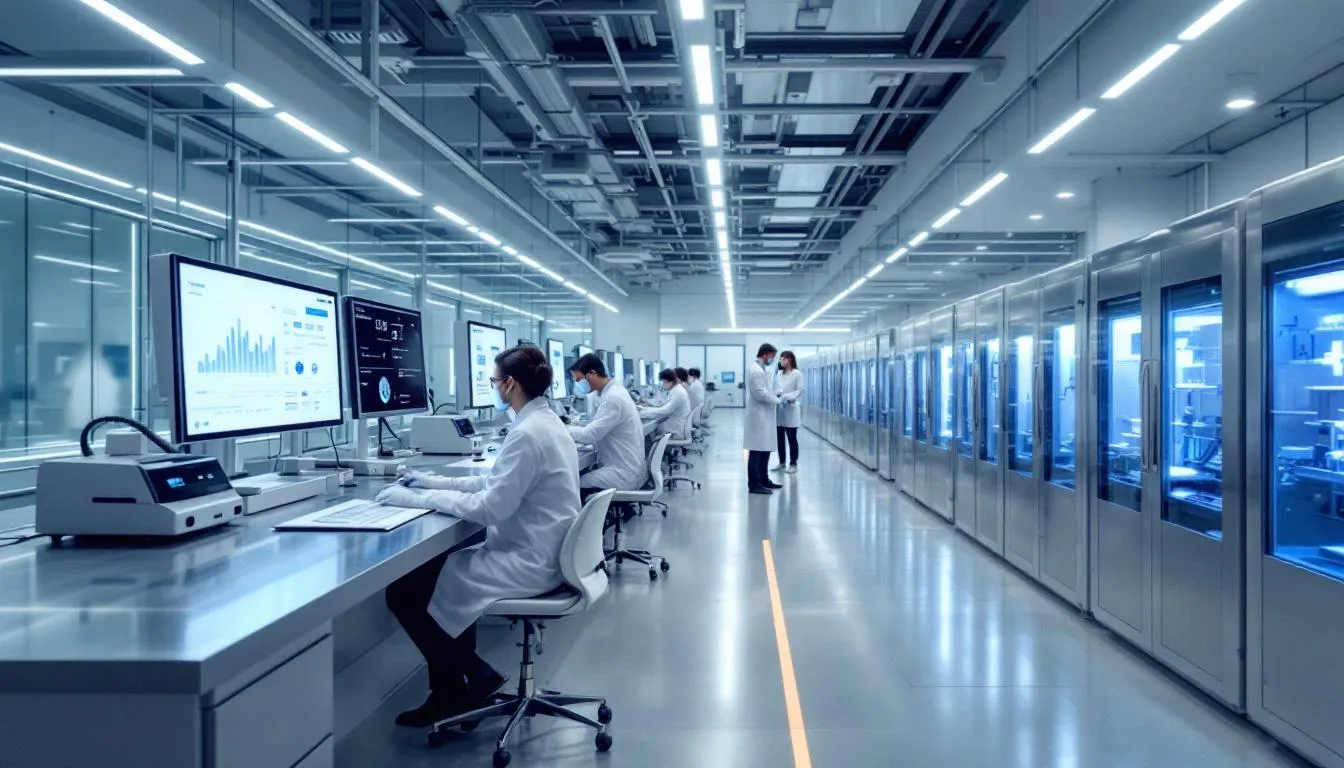
Establishing robust quality control and assurance processes is critical for identifying errors early in lab operations and ensuring accurate results. Quality control in laboratories aims to minimize errors by implementing systematic measures to ensure accurate and reliable outcomes. Quality assurance involves systematic processes to guarantee the accuracy and reliability of test results, helping laboratories maintain a high standard of operational excellence.
Effective sample management and data management practices are also vital for ensuring the accuracy and reliability of laboratory results. Ongoing training is essential for the long-term effectiveness of these quality control and assurance processes, keeping laboratory personnel updated on best practices and new technologies.
Quality Control Measures
Regular preventive maintenance helps identify potential issues before they lead to equipment breakdowns, thereby enhancing operational reliability and maintaining quality control. Neglecting equipment maintenance can lead to inaccuracies in research results and increase the risk of operational failures. Utilizing advanced tracking systems minimizes the chances of error prone related to sample misidentification, contributing to more accurate results.
Regular audits and analysis of procedures are essential components of effective quality control measures. Implementing advanced technology, such as LIMS, can centralize quality control data, support compliance, and improve overall laboratory efficiency by automating data entry and reducing human error.
Compliance with Regulatory Standards
Adhering to industry regulations helps laboratories avoid legal issues and maintain ethical standards. Compliance with regulatory standards, such as ISO and WHO regulations, is essential for laboratories to maintain credibility and ensure quality assurance. This adherence helps prevent legal penalties and enhances the laboratory’s reputation.
LIMS can facilitate compliance with regulatory standards by managing data and automating reporting processes, ensuring that laboratories meet regulatory requirements effectively and efficiently. This systematic approach to compliance supports continuous improvement in laboratory operations and maintains high standards of safety and quality.
Personnel Training and Development
Investing in continuous education and training programs enhances laboratory staff’s skills and positively affects operational performance. Proper training ensures compliance with SOPs and keeps staff updated on new health technologies, contributing to a safe and efficient working environment.
Courses such as ‘Managing Biomedical Laboratory Operations’ provide crucial educational opportunities for lab personnel, preparing them for roles in laboratory operations management, quality assurance, and regulatory positions. The Michigan State University online Masters degree in Biomedical Laboratory Operations is designed for individuals with previous clinical laboratory experience, offering a specialized pathway for advancing their careers in this field. This biomedical science program can be completed fully online. The curriculum is customized to the student's interests and supports their research project. Students can use their Masters of Science in Biomedical Laboratory Operations to meet the eligibility requirement for the Diplomate in Laboratory Management ASCP exam. Students conduct research projects with resident and adjunct faculty. The program provides mentorship that creates career advancement opportunities. Students must complete a research project in an area of interest under the guidance of faculty and mentors. The program offers clinically relevant courses in diagnostic theory and application. The core curriculum includes topics such as molecular diagnostics, advanced flow cytometry, and scientific writing. Graduates can pursue advanced roles as managers, administrators, researchers, and policymakers in the field.
Training Programs
Comprehensive safety protocols should include proper training, the use of personal protective equipment, and clear emergency procedures. Laboratory personnel should attend safety training and read all safety procedures before commencing experiments, ensuring a safe working environment and protecting personnel.
Effective training in laboratory operations is essential for ensuring a safe working environment and protecting personnel. Implementing robust training programs fosters a culture of safety and continuous improvement, enhancing overall operational efficiency.
Professional Development
Continuing education fosters both personal growth and team performance in laboratory settings, driving continuous improvement in operations. By partnering with external partners and institutions, laboratories can enhance their training programs and ensure that personnel are equipped with the latest scientific knowledge, expertise, and skills in their career field, promoting effective communication and practice.
This focus on professional development helps laboratories stay at the cutting edge of successful scientific research and innovation, supporting a culture of excellence in applied science and continuous improvement in science.
Data Management and Security
Efficient data management practices are essential to draw meaningful conclusions from laboratory analyses. Proper documentation of laboratory processes and outcomes is vital for compliance and can facilitate both internal and external audits. Advanced instruments can provide real-time analyzing data analysis, which aids in making quicker and more informed decisions. Digital solutions simplify compliance management by automating record-keeping, further enhancing operational efficiency and accuracy.
Integrating advanced instruments with lab management systems accelerates data processing and enhances error detection, ensuring data integrity and supporting high-quality research outcomes.
Data Collection and Analysis
Robust data collection systems facilitate accurate and timely insights, essential for informed decision-making in laboratories. Implementing standardized protocols in data collection aids in maintaining consistent documentation and file formats, supporting data integrity and reliability.
Systematic storage protocols allow for easier retrieval and enhance sample traceability, ensuring that data is managed efficiently and securely throughout the research process, including proper record keeping.
Data Security Protocols
Implementing robust data security measures, such as audit trails and access controls, is essential for maintaining the integrity and confidentiality of laboratory data. Employing encryption and access controls is vital for protecting laboratory data from unauthorized access, ensuring compliance with data protection laws.
Key elements of data security include:
-
Access control
-
Data encryption
-
Regular backups
-
Incident response plans
Ensuring data integrity and confidentiality is crucial for maintaining trust and reliability in laboratory operations.
Safety in Laboratory Operations
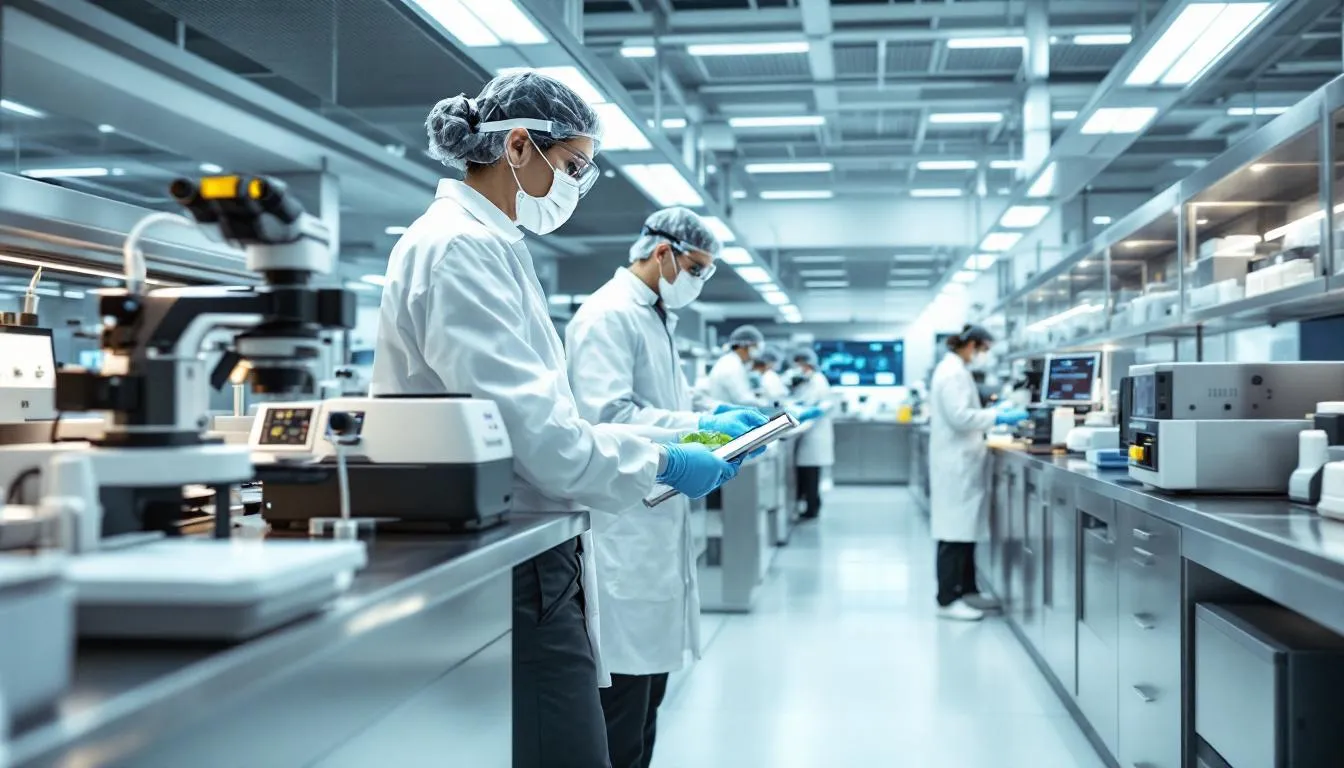
The foremost concern in laboratory operations should be safety to protect both personnel and the working environment. Establishing clear safety protocols and emergency response plans is essential for minimizing risks and enhancing safety within laboratory settings.
Training in laboratories includes a mix of management, leadership, technical, and safety skills, ensuring a comprehensive approach to safety.
Safety Protocols
Establishing clear safety protocols is essential for minimizing risks and enhancing safety within laboratory settings. Proper personal protective equipment, like gloves and safety goggles, must be worn at all times in the laboratory to ensure safety and compliance with regulatory standards.
Laboratories should regularly review and update safety practices to address new hazards and improve overall safety. By implementing comprehensive safety protocols, laboratories can create a safe working environment and protect their personnel.
Emergency Preparedness
Laboratories should have clearly defined emergency response plans, including evacuation routes and procedures for hazardous spills, to ensure safety during emergencies. Effective emergency preparedness includes developing response plans and conducting regular drills to ensure readiness in case of various incidents.
Regular emergency drills help ensure that all laboratory personnel are familiar with response procedures in case of an incident, enhancing overall safety and preparedness.
Operational Challenges in Laboratory Management
Laboratory management faces a range of operational challenges that can impact the efficiency and effectiveness of laboratory operations. These challenges often stem from the complexities of equipment maintenance, the need for ongoing personnel training, and the demands of regulatory compliance. Addressing these issues is essential for maintaining high standards in laboratory management and supporting successful scientific research.
Common Obstacles and Solutions
Among the most common obstacles in laboratory management are time-consuming and error-prone processes, gaps in personnel training, and limited access to resources. These challenges can hinder operational efficiency and compromise data integrity, ultimately affecting the quality of scientific research. To overcome these hurdles, laboratory managers should focus on automating lab workflows to reduce manual errors and streamline routine tasks. Implementing comprehensive training programs ensures that personnel are equipped with the latest knowledge and skills, fostering a culture of continuous improvement and safety.
Strategic partnerships with external partners can provide access to specialized expertise and additional resources, further enhancing laboratory capabilities. Prioritizing quality control and robust data management practices helps maintain data integrity and supports compliance with regulatory standards. By adopting these essential practices, laboratory managers can create an environment that promotes the well-being of personnel, minimizes risks, and ensures that labs operate efficiently and effectively. Ultimately, a proactive approach to laboratory management enables researchers to focus on their core mission—advancing scientific knowledge through successful and reliable research.
Leveraging Technology for Operational Efficiency
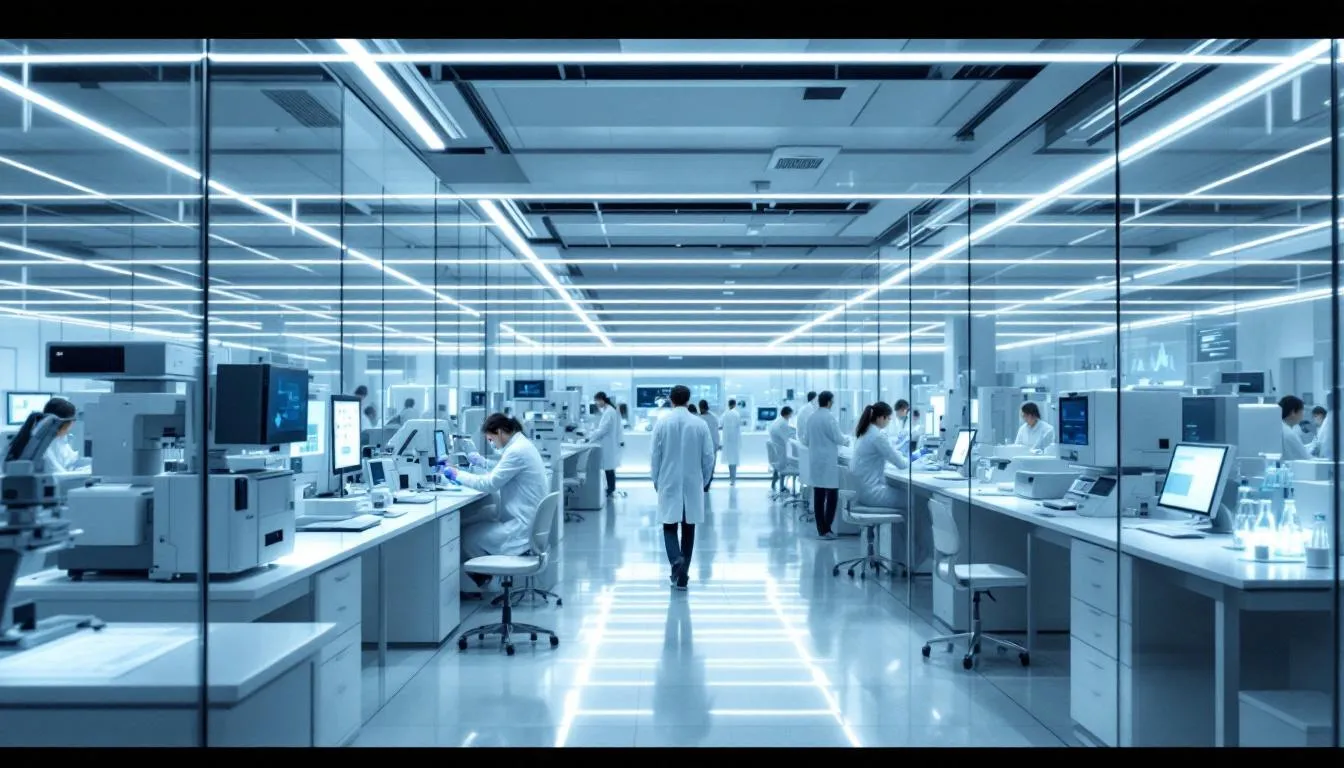
Leveraging technology is essential for improving laboratory operations, enabling labs to meet regulatory requirements effectively and efficiently. Implementing technological solutions improves overall productivity by reducing time spent on manual tasks and allowing laboratory personnel to focus on more critical activities.
For example, the adoption of AI-driven automation has streamlined sample processing and data analysis, significantly reducing turnaround times and minimizing human error in laboratory workflows. This demonstrates how recent technological advancements are applied in real-world lab settings to enhance operational efficiency.
Laboratory Information Management Systems (LIMS)
Modern systems for data collection, like Electronic Lab Notebooks (ELN) and Laboratory Information Management Systems (LIMS), streamline data handling and analysis in labs. LIMS offers several advantages:
-
Automates operations
-
Streamlines processes
-
Eliminates manual workloads
-
Allows real-time information access
-
Enhances lab design
These features significantly improve operational efficiency.
Using tools like statistical software can significantly improve data analysis and reporting in laboratories, enhancing the accuracy and reliability of research outcomes. Providing training on LIMS enhances operational efficiency and ensures personnel proficiency in using these advanced systems.
Integrating Advanced Instruments
Integrating advanced instruments boosts operational turnaround time and enables hassle-free, error-free operations, significantly enhancing laboratory efficiency. Calibrated and interfaced instruments are essential for enhancing accuracy in laboratory operations, ensuring that measurements are reliable and consistent.
Incorporating advanced instruments into laboratory operations achieves higher levels of precision and reduces the likelihood of errors, supporting high-quality research outcomes.
Summary
In summary, effective laboratory operations management involves a holistic approach that encompasses defining processes and workflows, budgeting and resource allocation, equipment calibration and maintenance, sample management, quality control and assurance, personnel training and development, data management and security, safety protocols, and leveraging technology. By implementing these strategies, laboratories can enhance operational efficiency, ensure accurate and reliable results, and foster a culture of continuous improvement. Cloud-based LIMS helps make information accessible in real-time, further supporting seamless operations and collaboration.
The journey to mastering laboratory operations management is ongoing, but with the right strategies and a commitment to excellence, laboratories can achieve remarkable success. Remember, every procedure, every piece of equipment, and every team member plays a vital role in the symphony of scientific discovery. Let these strategies guide you towards a future of innovation and excellence in laboratory operations.
Frequently Asked Questions
Why is establishing Standard Operating Procedures (SOPs) important in laboratory operations?
Establishing Standard Operating Procedures (SOPs) is crucial for ensuring consistency and accuracy in laboratory operations, which in turn maintains operational efficiency and compliance with regulatory standards. This structured approach leads to more reliable results and fosters a safer work environment.
How can workflow optimization improve laboratory operations?
Workflow optimization significantly improves laboratory operations by increasing efficiency and productivity through streamlined processes, reduced time-consuming tasks, and the elimination of bottlenecks. This leads to a more effective and reliable laboratory environment.
What role does preventive maintenance play in laboratory operations?
Preventive maintenance is essential in laboratory operations as it prolongs the lifespan of equipment, enhances safety, and ensures reliable performance by addressing potential issues proactively. This approach minimizes the risk of unexpected equipment failures and operational disruptions.
How does LIMS improve data management in laboratories?
LIMS significantly enhances data management in laboratories by automating operations, streamlining processes, and providing real-time access to information, thus improving operational efficiency and data accuracy.
Why is continuous education important for laboratory personnel?
Continuous education is vital for laboratory personnel as it enhances their skills, ensures compliance with standard operating procedures, and keeps them informed about the latest health technologies, ultimately promoting a safe and efficient workplace.
Share this
You May Also Like
These Related Stories
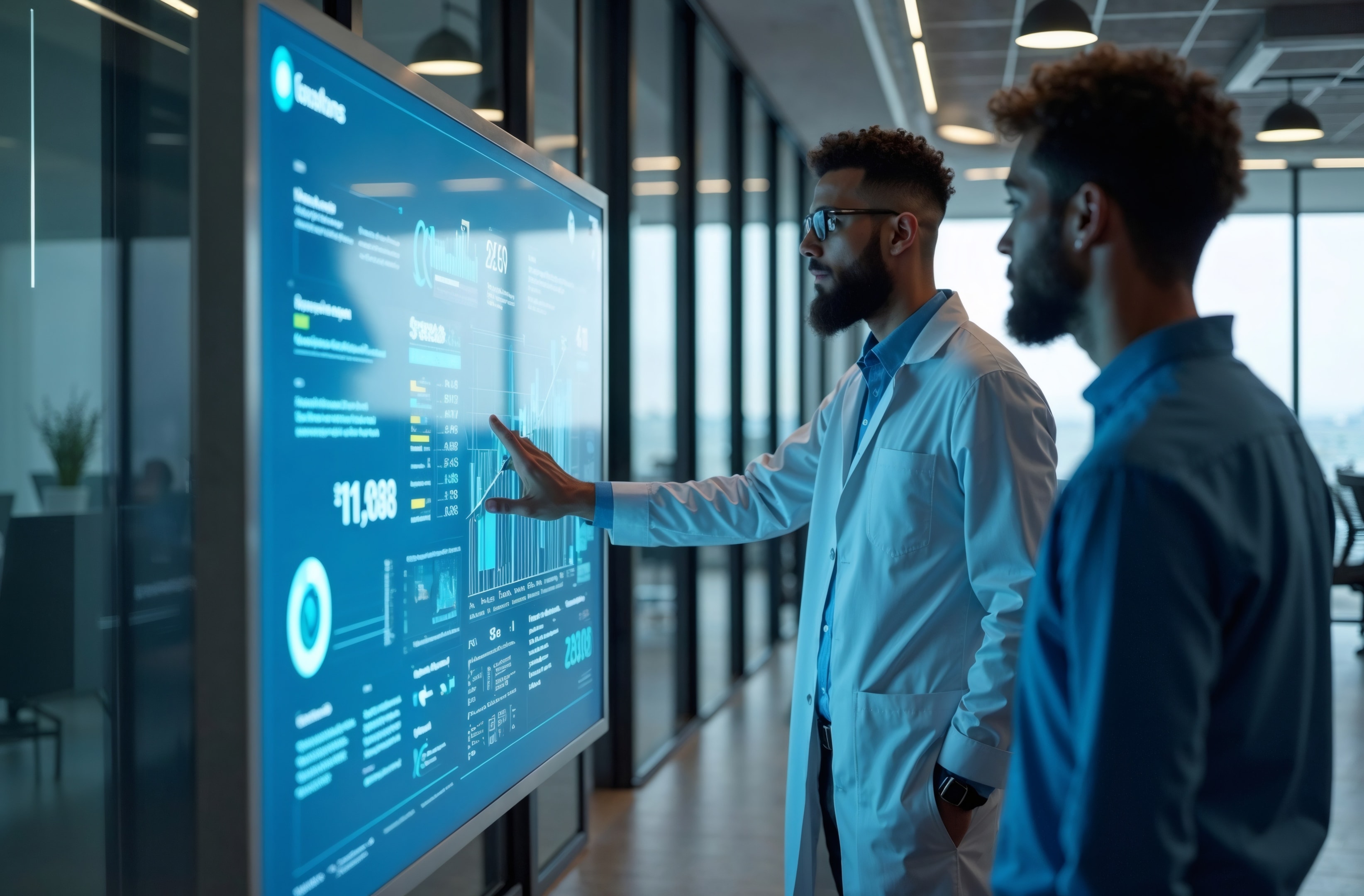
Maximizing Efficiency with LIMS Reporting: A Practical Guide for Labs

What is a Laboratory Information Management System?
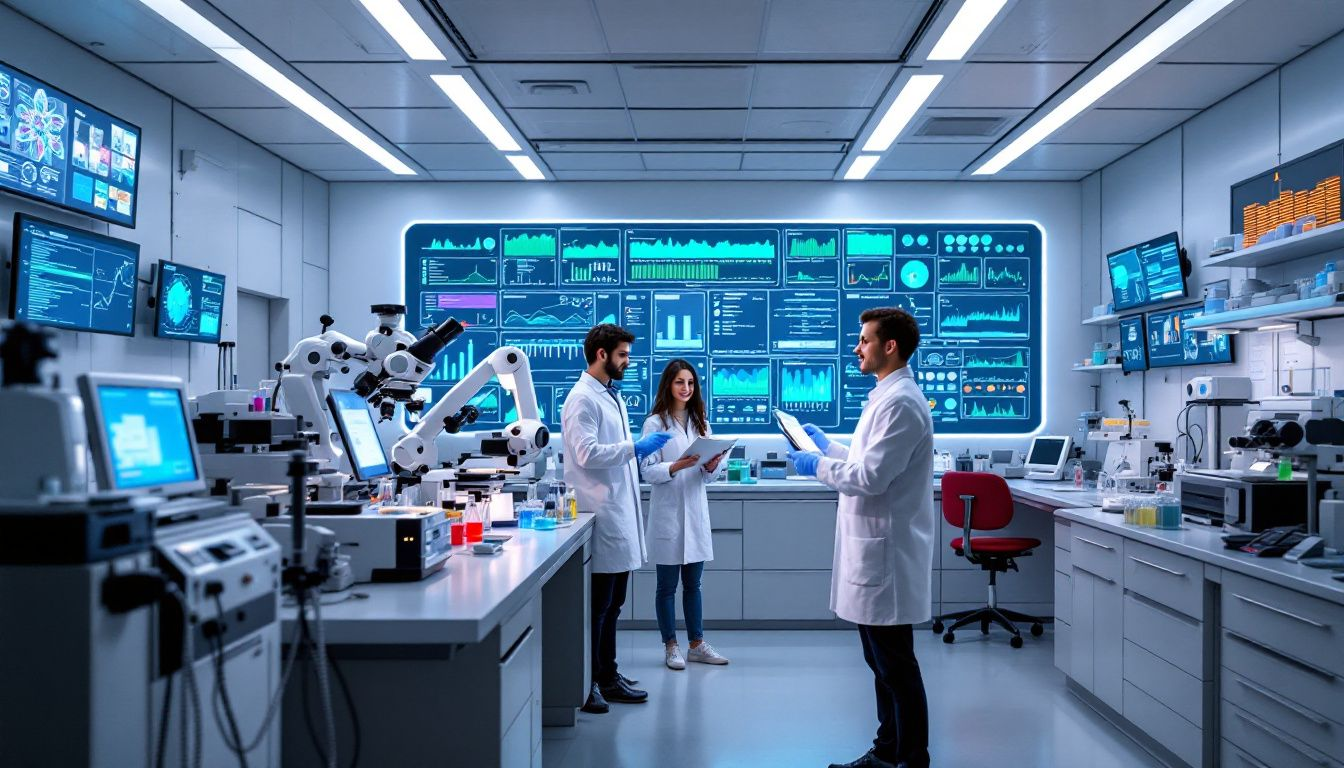

No Comments Yet
Let us know what you think